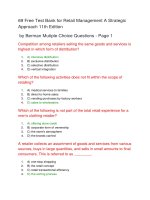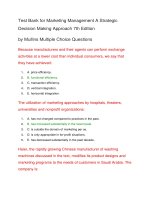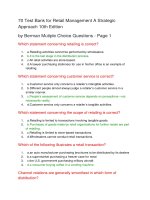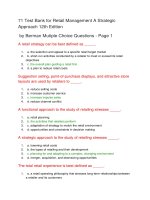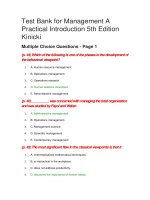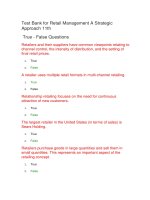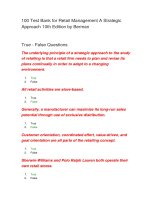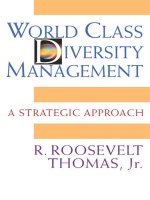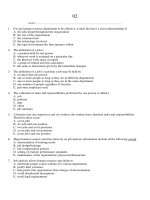69 free test bank for retail management a strategic approach 11th edition
Bạn đang xem bản rút gọn của tài liệu. Xem và tải ngay bản đầy đủ của tài liệu tại đây (85.15 KB, 15 trang )
69 Free Test Bank for Retail Management A Strategic
Approach 11th Edition
by Berman Mutiple Choice Questions - Page 1
Competition among retailers selling the same goods and services is
highest in which form of distribution?
1.
A) intensive distribution
2.
B) exclusive distribution
3.
C) selective distribution
4.
D) vertical integration
Which of the following activities does not fit within the scope of
retailing?
1.
A) medical services to families
2.
B) direct-to-home sales
3.
C) vending purchases by factory workers
4.
D) sales to wholesalers
Which of the following is not part of the total retail experience for a
men's clothing retailer?
1.
A) offering store credit
2.
B) corporate form of ownership
3.
C) the store's atmosphere
4.
D) the brands carried
A retailer collects an assortment of goods and services from various
sources, buys in large quantities, and sells in small amounts to final
consumers. This is referred to as ________.
1.
A) one-stop shopping
2.
B) the retail concept
3.
C) retail transactional efficiency
4.
D) the sorting process
Point-of-purchase displays and the placement of goods in visible,
high-traffic store locations are important in retailing because of the
need to ________.
1.
A) sell services to a broad target market
2.
B) generate impulse sales
3.
C) minimize the need for warehouse space
4.
D) limit pilferage to an acceptable level
Which statement concerning Target Stores' retail strategy is not
correct?
1.
A) Target focuses on consumers with middle incomes, who are well educated.
2.
B) Excellent customer service is an important part of Target's success.
3.
C) Despite its success, Target has not done a good job of positioning itself.
4.
D) Target has never lost sight of its discount niche.
The largest company in the world based on sales is ________.
1.
A) ExxonMobil
2.
B) Sears Roebuck
3.
C) Wal-Mart
4.
D) Marks & Spencer
About how many people are employed by traditional retailers in the
United States?
1.
A) 11 million
2.
B) 16 million
3.
C) 25 million
4.
D) 34 million
According to the Department of Commerce, annual U.S. retail store
sales are about ________.
1.
A) $200 billion
2.
B) $1.5 trillion
3.
C) $3.5 trillion
4.
D) $5.0 trillion
The sorting process helps manufacturers by ________.
1.
2.
A) paying on the basis of when goods are shipped, not sold
B) offering an assortment of goods that are collected from a large number of
suppliers
3.
C) enabling one-stop shopping
4.
D) buying large orders at one time
Data on U.S. retail employment understates actual employment
because it does not include ________.
1.
A) store or department managers
2.
B) part-time personnel
3.
C) seasonal employees and unreported workers in family businesses
4.
D) teenagers under 18 who are full-time students
The retailing concept is comprised of ________.
1.
A) objectives, implementable actions, feedback, and strategy adjustment
2.
B) short- and long-term objectives, organization mission, and the development
of a competitive defensible strategy
3.
C) customer orientation, coordinated effort, value-driven, and goal orientation
4.
D) niche strategy, cost leadership, and focus
Suppliers sell through a moderate number of retailers in ________
distribution.
1.
A) intensive
2.
B) dual
3.
C) exclusive
4.
D) selective
Which factor has had the greatest impact on the success of Target
Stores?
1.
A) its low pricing strategy
2.
B) its development and use of a retail strategic plan
3.
C) its excellent physical distribution systems
4.
D) its outstanding customer service
All of the elements in a retail offering that encourage or inhibit
consumers during their contact with a given retailer comprises
________.
1.
A) store atmosphere
2.
B) the retail concept
3.
C) the total retail experience
4.
D) retail image
A retailer often must limit its selection of brands in ________
distribution.
1.
A) wide
2.
B) intensive
3.
C) selective
4.
D) exclusive
The sorting process helps final consumers through ________.
1.
A) allowing store credit
2.
B) providing one-stop shopping convenience
3.
C) operating long hours
4.
D) providing delivery services
In exclusive distribution, suppliers enter into agreements with
________.
1.
A) multiple retailers that designate the latter as the only companies in
specified geographic areas that are allowed to carry certain brands and/or
product lines
2.
B) one or a few retailers that designate the latter as the only ones in specified
geographic areas to carry certain brands or product lines
3.
C) any retailer with ample credit that designates the latter to be allowed to
carry certain brands and/or product lines
4.
D) a retailer stating that the retailer cannot carry any competing product lines
as a precondition for receiving favorable discounts
A manufacturer seeking to maximize its sales should utilize
________ distribution.
1.
A) intensive
2.
B) dual
3.
C) exclusive
4.
D) selective
Which form of distribution has the effect of most severely limiting a
manufacturer's long-run sales potential?
1.
A) intensive distribution
2.
B) selective distribution
3.
C) dual distribution
4.
D) exclusive distribution
Which statement concerning retailing is correct?
1.
A) Retailing activities must involve a store.
2.
B) Retailing activities do not have to include a retailer.
3.
C) Retailing activities cannot be performed by a wholesaler.
4.
D) Retailing activities involve goods, not services.
The first stage in development of a retail strategy should be to
________.
1.
A) develop an overall long-run plan
2.
B) decide on the appropriate target market
3.
C) determine the type of business and specific orientation of the firm
4.
D) implement an integrated strategy
Retailers have increased their power in the channel of distribution
due to ________.
1.
A) the growing number of regional and national chains
2.
B) the growth of franchising as an alternative to independent ownership
3.
C) the increased market share of national brands
4.
D) shopping center contract provisions' limiting the range of goods to be sold
Channel relations tend to be the smoothest in ________
distribution.
1.
A) exclusive
2.
B) selective
3.
C) intensive
4.
D) wide
In 2007, the 10 largest U.S. retailers had average after-tax profits of
about ________ percent of sales.
1.
A) 0.5
2.
B) 1.0
3.
C) 2.5
4.
D) 3.5
The channel of distribution consists of ________.
1.
A) the movement of goods and services from manufacturer to consumer-user
2.
B) all of the businesses and people involved in the physical movement and
transfer of ownership of goods and services from producer to consumer
3.
C) all independent intermediaries involved with the transfer of title of goods
and services
4.
D) all middlemen involved with the physical movement of goods and services
Which of the following is generally not considered a party in a
typical channel of distribution?
1.
A) retailer
2.
B) final consumer
3.
C) wholesaler
4.
D) advertising agency
Manufacturers can increase their power in a distribution channel
through ________.
1.
A) operating their own retail facilities
2.
B) developing dealer brands
3.
C) expanding into foreign markets
4.
D) use of intensive distribution
On the average, ________ percent of every sales dollar goes to
grocery stores as payment for the activities they perform.
1.
A) 12
2.
B) 18
3.
C) 28
4.
D) 50
A retailer sells to customers through traditional retail stores, mailorder catalogs, and a Web site. This illustrates ________.
1.
A) vertical integration
2.
B) the sorting process
3.
C) multi-channel retailing
4.
D) the importance of impulse retailing
A retail strategy is ________.
1.
A) the overall plan guiding a retail firm
2.
B) the choice and satisfaction of a target market
3.
C) an integrated effort by a retailer
4.
D) a goal-directed effort by a retailer
In 2007, the four largest retailing companies (in order of size from
largest to fourth largest on the basis of sales) were ________.
1.
A) Wal-Mart, Sears, Safeway, and J.C. Penney
2.
B) Wal-Mart, Home Depot, CVS Caremark, and Kroger
3.
C) Wal-Mart, Kmart, Kroger, and Federated Department Stores
4.
D) Wal-Mart, Woolworth, Kroger, and Kmart
69 Free Test Bank for Retail Management A Strategic
Approach 11th Edition by Berman Mutiple Choice
Questions - Page 2
A retailer's focusing on store atmosphere, customer service, and
exceeding a consumer's expectations is concerned with ________.
1.
A) the total retail experience
2.
B) employee empowerment
3.
C) relationship retailing
4.
D) a value orientation
An example of the contrasting viewpoints of retailers and
manufacturers is a ________.
1.
A) manufacturer-sponsored cooperative advertising program
2.
B) manufacturer attempting to increase national brand display space
3.
C) manufacturer sponsoring training programs for retail sales personnel
4.
D) manufacturer sponsoring point-of-purchase materials
The potential for channel conflict (due to the high power of a retailer
relative to a manufacturer) is least in which form of distribution?
1.
A) dual distribution
2.
B) exclusive distribution
3.
C) selective distribution
4.
D) intensive distribution
In which form of distribution do retailers typically agree to limit their
assortment of brands in a selected product category?
1.
A) intensive
2.
B) dual
3.
C) exclusive
4.
D) selective
The use of customer loyalty programs by a hotel chain that grants
rewards, such as room upgrades and free rooms to loyal
customers, is an important part of ________.
1.
A) the total retail experience
2.
B) relationship retailing
3.
C) customer service
4.
D) the retailing concept
Which retail strategy focuses on existing customers?
1.
A) the retail concept
2.
B) the functional approach to retailing
3.
C) relationship retailing
4.
D) transactional retailing
Which of the following illustrates a retail transaction?
1.
2.
3.
4.
A) a supermarket purchasing a computer system to improve its inventory
management
B) a discount retailer signing a 10-year lease on a new store location
C) a wholesaler selling new windows to a home improvement center for resale
to homeowners
D) an attorney purchasing a computer in conjunction with a hobby
Neither channel cooperation nor long-term sales potential is
maximized in ________ distribution.
1.
A) vertical
2.
B) exclusive
3.
C) intensive
4.
D) selective
Channel cooperation and control is greatest when ________.
1.
A) intensive distribution is utilized
2.
B) selective distribution is utilized
3.
C) exclusive distribution is utilized
4.
D) manufacturers own and operate their own retailing facilities
A characteristic of relationship retailing is
1.
A) reliance on a data base of current customers
2.
B) search for new customers
3.
C) constant bargaining between customers and suppliers
4.
D) low trust among channel members
The strategic approach to the study of retailing stresses ________.
1.
A) retail institutions
2.
B) retail profits
3.
C) legal issues
4.
D) retail planning
Strategic planning in retailing ________.
1.
2.
A) can be practiced by both small and large retailers
B) requires a comprehensive computer-based marketing information system
to be properly implemented
3.
C) should focus on short-run opportunities
4.
D) requires the use of planning specialists with MBA degrees to succeed
A retailer is able to appeal to different target markets, as well as
reach consumers in multiple places, through engaging in
________.
1.
A) Web sales
2.
B) multi-channel retailing
3.
C) relationship retailing
4.
D) vertical integration
The functional orientation to the study of retailing stresses
________.
1.
A) retail activities
2.
B) retail planning
3.
C) adaptation of retail strategy to match the retail environment
4.
D) opportunities and constraints in decision making
The selection of an appropriate target market by a retailer relates to
which element of the retailing concept?
1.
A) goal orientation
2.
B) customer orientation
3.
C) coordinated effort
4.
D) value orientation
Convenience goods are generally marketed using ________
distribution.
1.
A) dual
2.
B) exclusive
3.
C) selective
4.
D) intensive
An optical chain purchasing goods from dozens of vendors (these
include frame companies, lens firms, sunglass manufacturers, and
eyeglass case firms) demonstrates ________.
1.
A) a channel of distribution
2.
B) economies of scale
3.
C) vertical integration
4.
D) the sorting process
The identifiable, but sometimes intangible, activities undertaken by
a retailer in conjunction with the basic goods and services it sells is
referred to as ________.
1.
A) the retailing concept
2.
B) the total retail experience
3.
C) relationship retailing
4.
D) customer service
Which of the following is not an important characteristic of
relationship retailing?
1.
A) the continuous monitoring of customer satisfaction
2.
B) the development and maintenance of a data base on all customers
3.
C) the seeking of long-term bonds with existing customers
4.
D) the continuous seeking of new customers to replace lost customers
Retailers typically study prospective locations in terms of the
characteristics of shoppers, neighboring retailers, pedestrian traffic
counts by day of week and hour, and parking facilities. This
intensive analysis is due to the ________.
1.
A) importance of impulse sales to all retailers
2.
B) long-term nature of retail leases
3.
C) high rent charged for store locations
4.
D) need to attract consumers to a store location
Which statement concerning strategic planning is correct?
1.
A) Strategic plans can be best used by large retailers.
2.
B) Strategic planning should be conducted on an annual basis.
3.
4.
C) Strategic plans should emphasize attracting customers via price-oriented
promotions.
D) Strategic planning is a continuous process.
A characteristic of a retail strategy is its ________.
1.
A) attention to personnel availability and training
2.
B) attention to short-run success
3.
4.
C) systematic assessment of the environment to ascertain opportunities and
threats
D) focus on past operations and success
A manufacturer seeking maximum retailer cooperation should utilize
which form of distribution?
1.
A) exclusive distribution
2.
B) intensive distribution
3.
C) selective distribution
4.
D) dual distribution
The sorting process enables manufacturers to ________.
1.
A) specialize in the production and marketing of a narrow product line
2.
B) vertically integrate
3.
C) increase their channel control over retailers
4.
D) dictate final selling prices to retailers
Loss leaders, weekly promotions, an excellent location, and special
events (such as cooking classes) are more common in retailing
than in wholesaling because ________.
1.
A) profit margins in retailing are higher than in wholesaling
2.
B) retailing is the final stage in the channel of distribution
3.
C) most retail customers must be drawn to a store location
4.
D) the average sale in retailing is smaller than in wholesaling
The training of personnel to sell related merchandise (such as
batteries, a case, and extra film with a camera) represents an
attempt to maximize ________.
1.
A) impulse sales
2.
B) manufacturer cooperation
3.
C) self-service merchandising
4.
D) the number of customers drawn to a store
An off-price chain specializing in fashion merchandise at deep
discounts uses low-rent locations, self-service merchandising, and
inexpensive fixtures. Alterations are not available and merchandise
can be returned for store credit only. The chain illustrates which
element of the retailing concept?
1.
A) customer orientation
2.
B) coordinated effort
3.
C) competitive intelligence
4.
D) goal orientation
The greatest advantage to a manufacturer's use of exclusive
distribution is ________.
1.
A) a high level of retail price competition
2.
B) close channel cooperation
3.
C) maximizing long-run sales potential
4.
D) convenience of location to customers
Which statement concerning retailing is not correct?
1.
A) Retailing involves both goods and services.
2.
B) Retailing must involve a retailer.
3.
C) Direct selling is part of retailing.
4.
D) Retailing is the final stage in a channel of distribution.
Without the sorting process, final customers would ________.
1.
A) not purchase goods on impulse
2.
B) not receive credit
3.
C) have to shop at individual manufacturers
4.
D) reduce the number of transactions necessary to complete a purchase
A tire retailer guarantees to match all advertised specials of
competitors, includes installation and balancing in its quoted price,
and specializes in well-known tire brands. This illustrates which
element of the retailing concept?
1.
A) value-driven
2.
B) customer service
3.
C) competitive intelligence
4.
D) goal orientation
Consumers are able to shop in a "one-stop shopping environment"
due to the ________.
1.
A) increased size of stores
2.
B) development of franchising
3.
C) sorting process
4.
D) development of prototype stores
Retail price competition is generally highest in ________
distribution.
1.
A) dual
2.
B) exclusive
3.
C) intensive
4.
D) selective
A major disadvantage of the retailing concept as applied to the
development of a retail strategy is that it does not focus on
________.
1.
A) the development of a coordinated strategy
2.
B) a firm's competitive advantages
3.
C) specific objectives such as market share or return on sales
4.
D) the satisfaction of a firm's target market
Retail price competition is generally lowest in ________
distribution.
1.
A) dual
2.
B) exclusive
3.
C) intensive
4.
D) selective
Point-of-purchase displays, self-service merchandising, and the use
of high-traffic locations to place selected goods represents an
attempt by retailers to ________.
1.
A) control expenses
2.
B) increase the number of potential shoppers who enter a retail store
3.
C) reduce inventory levels
4.
D) increase impulse sales
The underlying principle of a strategic approach to the study of
retailing is that a firm needs to ________.
1.
A) be a low-cost provider
2.
B) base all of its decisions on retail research
3.
C) be aware of opportunities and constraints in decision making
4.
D) plan for and adapt to a complex, changing retail environment

